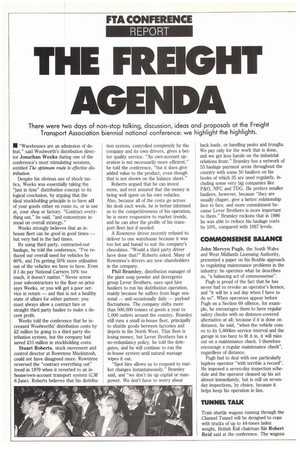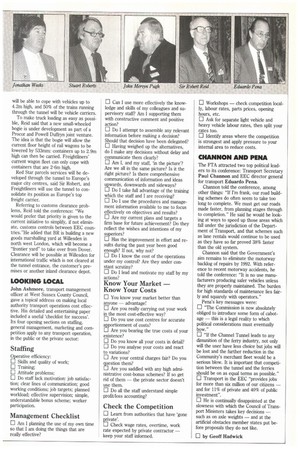THE FREIGHT AGENDA
Page 44

Page 45

If you've noticed an error in this article please click here to report it so we can fix it.
There were two days of non-stop talking, discussion, ideas and proposals at the Freight Transport Association biennial national conference: we highlight the highlights.
• "Warehouses are an admission of defeat," said Woolworth's distribution director Jonathan Weeks during one of the conference's most stimulating sessions, entitled The optimum route to effective distribution.
Despite his obvious use of shock tactics, Weeks was essentially taking the "just in time" distribution concept to its logical conclusion, by arguing that the ideal stockholding principle is to have all of your goods either en route to, or in use at, your shop or factory. "Contract everything out," he said, "and concentrate instead on overall strategy."
Weeks strongly believes that an inhouse fleet can be good in good times — but very bad in the bad times.
By using third party, contracted-out haulage, he told the conference, "I've reduced our overall need for vehicles by 60%, and I'm getting 50% more utilisation out of the vehicles we have to have. Even if I do pay National Carriers 10% too much, it doesn't matter." Never screw your subcontractors to the floor on price says Weeks, or you will get a poor service in return — and that is not a healthy state of affairs for either partner: you must always allow a contract hire or straight third party haulier to make a decent profit.
Weeks told the conference that he increased Woolworths' distribution costs by £2 million by going to a third party distribution system, but the company had saved £10 million in stockholding costs.
Stuart Roberts, stock movement and control director at Rowntree Mackintosh, could not have disagreed more. Rowntree reversed the "contract everything out" trend in 1979 when it reverted to an inhouse/own-account transport system (CM 6 June). Roberts believes that his distribu
tion system, controlled completely by the company and its own drivers, gives a better quality service. "An own-account operation is not necessarily more efficient," he told the conference, "but it does give added value to the product, even though that is not shown on the balance sheet."
Roberts argued that he can invest more, and rest assured that the money is being well spent on his own vehicles. Also, because all of the costs go across his desk each week, he is better informed as to the competitiveness of his operation, he is more responsive to market trends, and he can alter the profile of his transport fleet fast if needed.
A Rowntree driver recently refused to deliver to one warehouse because it was too hot and humid to suit the company's chocolates. "Would a third party driver have done that?" Roberts asked. Many of Rowntree's drivers are now shareholders in the company.
Phil Brumley, distribution manager of the giant soap powder and detergents group Lever Brothers, uses spot hire hauliers to run his distribution operation, mainly because he suffers from huge seasonal — and occasionally daily — payload fluctuations. The company shifts more than 500,000 tonnes of goods a year to 1,000 outlets around the country. Bromley still runs a small in-house fleet, principally to shuttle goods between factories and depots in the North West. That fleet is losing money, but Lever Brothers has a no-redundancy policy, he told the delegates, and he will continue to run the in-house system until natural wastage wipes it out.
"Spot hire allows us to respond to market changes instantaneously," Bromley said, and "we don't tie up captial or manpower. We don't have to worry about back loads, or handling peaks and troughs. We pay only for the work that is done, and we get less hassle on the industrial relations front." Bromley has a network of 53 haulage payment areas throughout the country with some 50 hauliers on his books of which 35 are used regularly, including some very big companies like P&O, NFC and TDG. He prefers smaller hauliers, however, because "they are usually diaper, give a better relationship face to face, and more commitment because Lever Brothers is more important to them." Bromley reckons that in 1986 he was able to reduce his haulage costs by 10%, compared with 1987 levels.
COMMONSENSE BALANCE
John Mervyn Pugh, the South Wales and West Midlands Licensing Authority, presented a paper on his flexible approach to regulating maintenance problems in the industry: he operates what he describes as, "a balancing act of commonsense".
Pugh is proud of the fact that he has never had to revoke an operator's licence, and "it will be a sad day when I have to do so". When operators appear before Pugh on a Section 69 offence, for example, he encourages them to have regular safety checks with no distance-covered alternative at all; because if it is done on distance, he said, "when the vehicle comes to its 5,800km service interval and the garage is too busy to fit it in, it will miss out on a maintenance check. I therefore encourage a regular maintenance check", regardless of distance.
Pugh had to deal with one particularly hapless operator "with terrible a record". He imposed a seven-day inspection schedule and the operator cleaned up his act almost immediately, but is still on sevenday inspections, by choice, because it helps keep his operation in line.
TUNNEL TALK
Train shuttle wagons running through the Channel Tunnel will be designed to cope with trucks of up to 94-tones laden weight, British Rail chairman Sir Robert Reid said at the conference. The wagons will be able to cope with vehicles up to 4.2m high, and 50% of the trains running through the tunnel will be vehicle carriers.
To make truck loading as easy as possible, Reid said that a new small-wheeled bogie is under development as part of a Procor and Powell Duffryn joint venture. The idea is that the bogie will allow the current floor height of rail wagons to be lowered by 533nun: containers up to 2.9m high can then be carried. Freightliners' current wagon fleet can only cope with containers that are 2.6m high.
Red Star parcels services will be developed through the tunnel to Europe's major city centres, said Sir Robert, and Freightliners will use the tunnel to consolidate its position as Europe's top freight carrier.
Referring to customs clearance problems, Reid told the conference: "We would prefer that priority is given to the current initiative to simplify, if not eliminate, customs controls between EEC countries."He added that BR is building a new goods marshalling yard at Willesden in north west London, which will become a "frontier yard" to take over from Dover. Clearance will be possible at Willesden for international traffic which is not cleared at the tunnel entrance, the customer's premises or another inland clearance depot.
LOOKING LOCAL
John Ashmore, transport management officer at West Sussex County Council, gave a topical address on making local authority transport operations cost effective. His detailed and entertaining paper included a useful 'checklist for success'. Its four opening sections on staffing, general management, marketing and competition apply to any transport operation, in the public or the private sector:
Staffing
14erative efficiency: LI Skills and quality of work; CI Training; O Attitude problems; D Do staff lack motivation: job satisfaction; clear lines of communication; good working conditions; job targets; planned workload; effective supervision; simple, understandable bonus scheme; worker participation.
Management Checklist
LI Am I planning the use of my own time so that I am doing the things that are really effective? CI Can I use more effectively the knowledge and skills of my colleagues and supervisory staff? Am I supporting them with constructive comment and positive action?
CI Do I attempt to assemble any relevant information before making a decision? Should that decision have been delegated? CI Having weighed up the alternatives, do I make any decisions without delay and communicate them clearly? CI Am I, and my staff, 'in the picture'? Are we all in the same picture? Is it the right picture? Is there comprehensive communication of information and ideas upwards, downwards and sideways? IL Do I take full advantage of the training which the staff and I are receiving?
O Do I use the procedures and management information available to me to focus effectively on objectives and results? O Are my current plans and targets a firm base for future achievement? Do they reflect the wishes and intentions of my superiors? LI Has the improvement in effort and results during the past year been good enough? If not, why not? O Do I know the cost of the operations under my control? Are they under constant scrutiny? El Do I lead and motivate my staff by my actions?
Know Your Market — Know Your Costs
CI You know your market better than an one — advantage!
• Are you really carrying out your work in the most cost-effective way? CI Do you use cost centres for accurate portionment of costs?
II Are you bearing the true costs of your existence?
CI Do you know all your costs in detail? CI Do you analyse your costs and react to variations?
CI Are your central charges fair? Do you question them?
DI Are you saddled with any high administrative cost-bonus schemes? If so get rid of them — the private sector doesn't use them.
CI Do all the staff understand simple profit/loss accounting?
Check the Competition
CI Learn from authorities that have 'gone pLivate'.
• Check wage rates, overtime, work rate expected by private contractor — keep your staff informed. CI Workshops — check competition locally, labour rates, parts prices, opening hours, etc.
0 Ask for separate light vehicle and heavy vehicle labour rates, then split your rates too.
El Identify areas where the competition is strongest and apply pressure to your internal area to reduce costs.
CHANNON AND PENA
The FTA attracted two top political leaders to its conference: Transport Secretary Paul Channon and EEC director general for transport Eduardo Pena.
Channon told the conference, among other things: "If I'm frank, our road building schemes do often seem to take too long to complete. We must get our roads made faster, from planning stages through to completion." He said he would be looking at ways to speed up those areas which fall under the jurisdiction of the Department of Transport, and that schemes such as lane rentals would continue to be used as they have so far proved 38% faster than the old system.
Channon said that the Government's aim remains to eliminate the motorway backlog of repairs by 1992. With reference to recent motorway accidents, he told the conference: "It is no use manufacturers producing safer vehicles unless they are properly maintained. The burden for high standards of maintenance lies fairly and squarely with operators."
Penn's key messages were: CI "The Commission is now absolutely obliged to introduce some form of cabotage — this is a legal reality to which political considerations must eventually bow."
0 "ff the Channel Tunnel leads to any dirmmition of the ferry industry, not only will the user have less choice but jobs will be lost and the further reduction in the Community's merchant fleet would be a serious blow. It is important that competition between the tunnel and the ferries should be on as equal terms as possible." CI Transport in the EEC "provides jobs for more than six million of our citizens — and for 11% of private and 40% of public investment".
El He is continually disappointed at the slowness with which the Council of Transport Ministers takes key decisions — such as on axle weights — and at the artificial obstacles member states put before proposals they do not like.
CI by Geoff Hadwick




































































































































